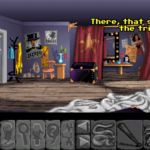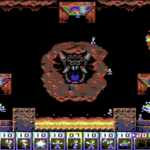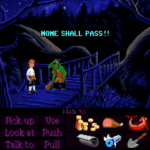Wow, this is one I did not expect to see coming back. The long forgotten ChipWits — an intriguing puzzler on the Commodore 64 as well as its original Mac and Apple II versions — is getting a reboot.
But the thing is, you can play the original already, thanks to a really useful official web-based emulation.
First, let’s have a look at the new version, then how to play the original ChipWits.
What is ChipWits?
If you’re unfamiliar with the game, it’s a sort of programming tutorial disguised as a problem-solving game. Various modern games have used this principle of learning to code through puzzlers, but I think ChipWits was the first to do this — certainly with an attractive graphical game. (Some text only games may have preceded it.)
In the game, you instruct robots to navigate rooms and collect items, using a basic programming technique. The manual explains it thus:
ChipWits is a game where you program robots to explore rooms and mazes filled with different kinds of objects. As you learn how to make the robots “think” for themselves, you will sharpen your problem-solving skills and learn some of the basic principles of computer programming.
Confession time… I’m terrible at coding anything beyond HTML and CSS. I’d always wanted to learn as a kid, but no one suggested ChipWits. However, I did have a copy of the game on the C64, played it once, and thought it terrible, so I ditched it. Without the manual (yes, it was a pirate) I had to frame of reference for the game or what its real purpose was.
Damn.
ChipWits reboot
So, I mentioned the ChipWits emulation site above. This is a fully official version, and is already promoting the new version, which already looks great with updated graphics, music, and gameplay.
Stated improvements are:
- A Legacy Reboot: Bringing the original 1984 game to a new generation of gamers, an accessible introduction to programming.
- Easy to Learn: No prior experience required. Learn how to control your ChipWit in the step-by-step tutorial that will have you programming in no time.
- Hard to Master: Missions build upon themselves with new challenges, chips, and mechanics. Later levels can have players using over a hundred chips across multiple chip boards.
- Efficiency is Key: Optimize your solutions to maximize your score, minimize the number of chips used, and minimize the number of steps in your program to secure a top spot on the global leaderboards!
- ChipWit Challenges: An expanding collection of standalone puzzles that challenge the ChipWits community to compete for the highest score or most efficient solution. Complete past challenges and check back regularly for new ones!
- Old and New: 8 original classic missions from the first ChipWits, and over 55 new puzzles and missions with revamped chips and mechanics will be in the full release.
Here’s the trailer:
You can wishlist the ChipWits reboot on Steam now.
The thing is, the new game looks great, but the old one isn’t exactly a disaster, despite being 40 years old…
How to play retro ChipWits
So, the Mac version was the original, released in 1984, followed by the Commodore 64 and Apple II versions the following year. ChipWits on the Mac was unsurprisingly monochrome, while the C64 and Apple II.
You can play the original game in your browser now at chipwits.com/retro/. The Mac, Apple II, and C64 versions are present (no sign of 2008’s ChipWits II), each with their individual controls listed.
Be warned, you can easily get sucked into playing ChipWits, which is why I think the new version is going to do really well on Steam. (Case in point; I started writing this article at lunchtime, and now it’s nearly time for bed…)
You can learn more about the open source version of ChipWits on its GitHub page.
Affiliate Disclosure: Some of the links in this post may be affiliate links, which means I may earn a small commission if you make a purchase through those links. This comes at no extra cost to you. Thank you for your support!
Christian Cawley is the founder and editor of GamingRetro.co.uk, a website dedicated to classic and retro gaming. With over 20 years of experience writing for technology and gaming publications, he brings considerable expertise and a lifelong passion for interactive entertainment, particularly games from the 8-bit and 16-bit eras.
Christian has written for leading outlets including TechRadar, Computer Weekly, Linux Format, and MakeUseOf, where he also served as Deputy Editor.
When he’s not exploring vintage consoles or retro PCs, Christian enjoys building with LEGO, playing cigar box guitar, and experimenting in the kitchen.







